Gardener Cockfosters
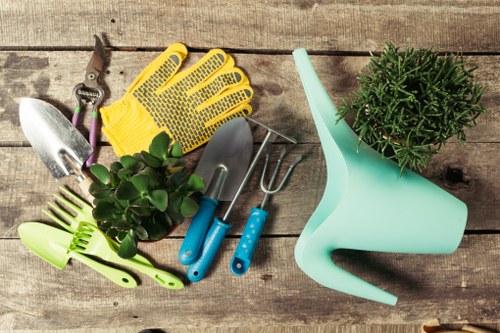
Welcome to the ultimate guide on being a gardener in Cockfosters. Whether you’re a seasoned green thumb or just starting your gardening journey, Cockfosters offers a unique environment for horticulture enthusiasts. In this article, we’ll explore everything you need to know about gardening in this charming area, from the best plants to grow to local gardening resources.
Gardening in Cockfosters is a rewarding experience because of the region’s favorable climate and rich soil. The area provides ample opportunities for both amateur and professional gardeners to cultivate beautiful and thriving gardens. With the right knowledge and tools, you can transform any space into a vibrant oasis.
One of the first things to consider when gardening in Cockfosters is the selection of plants. The local climate supports a wide variety of flora, allowing gardeners to experiment with different species and create diverse landscapes. From colorful flowers to sturdy shrubs, there’s something for every garden style.
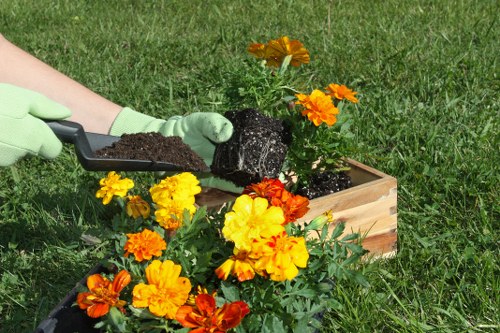
The Best Plants for Cockfosters Gardens
Selecting the right plants is crucial for a successful garden in Cockfosters. Here are some top choices that thrive in the area:
- Roses: Known for their beauty and fragrance, roses are a favorite among Cockfosters gardeners.
- Lavender: Perfect for adding color and a pleasant scent to your garden.
- Hostas: Ideal for shaded areas, hostas provide lush foliage.
- Herbs: Basil, thyme, and rosemary are excellent for both gardening and culinary uses.
- Perennials: Plants like peonies and daylilies come back year after year, requiring minimal maintenance.
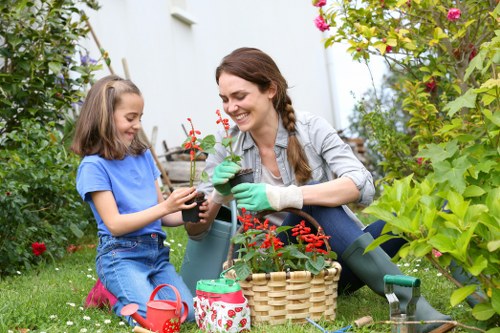
Essential Gardening Tools
Having the right tools makes gardening easier and more enjoyable. Here’s a list of essential gardening tools every Cockfosters gardener should have:
- Hand Trowel: Perfect for planting and transplanting small plants.
- Pruning Shears: Essential for trimming and shaping plants.
- Garden Fork: Great for turning soil and aerating garden beds.
- Watering Can: Necessary for providing adequate moisture to your plants.
- Gloves: Protect your hands from thorns, dirt, and debris.
Investing in quality tools ensures longevity and better performance, making your gardening tasks more efficient.
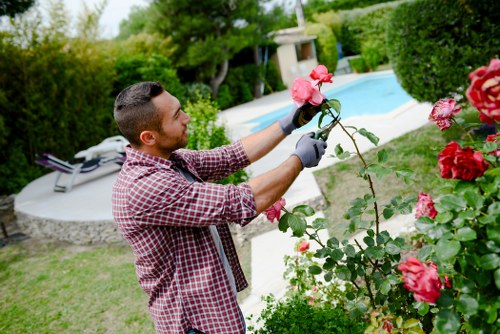
Soil Preparation and Maintenance
Healthy soil is the foundation of a thriving garden. In Cockfosters, the soil is generally fertile, but proper preparation can enhance its quality. Start by testing your soil to determine its pH and nutrient levels. Based on the results, you can add necessary amendments such as compost, manure, or lime to balance the soil composition.
Regular maintenance is also key to sustaining healthy soil. This includes mulching to retain moisture and suppress weeds, as well as rotating crops to prevent soil depletion. Additionally, incorporating organic matter helps improve soil structure and promotes beneficial microbial activity.
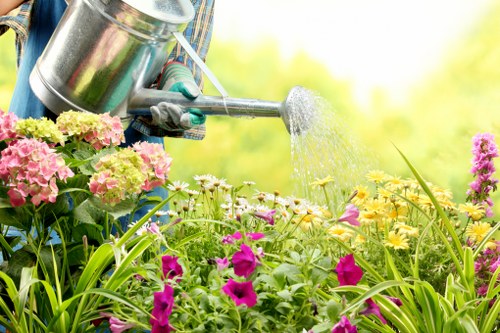
Local Gardening Resources in Cockfosters
Cockfosters boasts a variety of resources to support local gardeners. From community gardens to nurseries, there are plenty of opportunities to learn and grow. Joining a local gardening club can provide valuable insights and foster connections with fellow enthusiasts.
Additionally, the Cockfosters Community Garden offers plots for individuals to cultivate their own plants while sharing tips and experiences. Local nurseries provide a wide selection of plants suited to the area’s climate, along with expert advice to help you make informed decisions.
Workshops and Events
Participating in workshops and events is a great way to expand your gardening knowledge. These gatherings often feature demonstrations on various gardening techniques, plant care, and sustainable practices. Attending these events can inspire new ideas and enhance your gardening skills.
Gardening Classes
Many local organizations offer gardening classes tailored to different skill levels. Whether you’re a beginner or an experienced gardener, these classes can provide useful information and hands-on experience.

Designing Your Cockfosters Garden
Designing a garden involves planning the layout, selecting appropriate plants, and considering aesthetic elements. Start by sketching a basic layout, taking into account factors like sunlight exposure, soil type, and water availability.
Incorporate a mix of plant heights, colors, and textures to create visual interest. Consider adding features like pathways, seating areas, and water elements to enhance the garden’s appeal.
Choosing a Garden Style
There are various garden styles to choose from, each with its own unique characteristics:
- English Garden: Known for its romantic and formal design, featuring well-maintained flower beds and symmetrical layouts.
- Japanese Garden: Emphasizes natural beauty with elements like rocks, water, and carefully pruned plants.
- Modern Garden: Focuses on clean lines, minimalistic design, and a limited color palette.
- Cottage Garden: Features a charming, informal layout with a variety of flowers and herbs.

Seasonal Gardening Tips
Gardening activities vary with the seasons. Here are some tips to help you maintain your Cockfosters garden year-round:
Spring
Spring is the perfect time to prepare your garden for the growing season. Start by clearing away any debris from winter and fertilizing the soil. Plant new flowers, vegetables, and herbs, and prune any overgrown shrubs.
Summer
During the summer months, ensure your plants receive adequate water, especially during dry spells. Mulching helps retain moisture and reduce weed growth. Regularly deadhead flowers to encourage continuous blooming.
Autumn
Autumn is ideal for planting trees and perennials. Clean up fallen leaves and compost them for future use. Protect delicate plants from early frosts by covering them or bringing them indoors.
Winter
In winter, focus on planning and maintenance. Order seeds for the upcoming season and organize your gardening tools. Protect sensitive plants from frost by using covers or relocating them to sheltered areas.

Sustainable Gardening Practices
Embracing sustainable gardening practices not only benefits the environment but also enhances the health of your garden. Here are some ways to make your Cockfosters garden more eco-friendly:
- Composting: Recycle kitchen scraps and garden waste to create nutrient-rich compost for your plants.
- Rainwater Harvesting: Collect rainwater to reduce dependence on municipal water sources.
- Native Plants: Choose native species that are well-adapted to the local climate and require less maintenance.
- Pest Management: Use natural pest control methods, such as introducing beneficial insects and avoiding chemical pesticides.
- Energy Efficiency: Opt for solar-powered garden lights and energy-efficient tools to minimize your carbon footprint.
Implementing these practices contributes to a healthier ecosystem and a more resilient garden.
Water Conservation
Water is a precious resource, and conserving it ensures a sustainable gardening practice. Install drip irrigation systems to deliver water directly to plant roots, reducing evaporation and waste.
Mulching Techniques
Mulching not only helps retain soil moisture but also regulates soil temperature and reduces weed growth. Organic mulches, like wood chips and straw, add nutrients to the soil as they decompose.

Common Gardening Challenges in Cockfosters
Every gardener faces challenges, and Cockfosters is no exception. Understanding these common issues can help you overcome them effectively:
Pests and Diseases
Pests like aphids, slugs, and caterpillars can damage your plants. Implementing integrated pest management (IPM) strategies, such as introducing natural predators and using organic pesticides, can help control infestations.
Soil Erosion
Soil erosion can be a problem, especially in sloped areas. Planting ground covers and installing retaining walls are effective methods to prevent erosion and maintain soil integrity.
Weed Control
Weeds compete with your plants for nutrients and water. Regular weeding and the use of mulch can significantly reduce weed growth and keep your garden tidy.
Solutions and Prevention
Addressing gardening challenges requires proactive measures. Regular monitoring, proper plant care, and maintaining healthy soil are essential for preventing issues before they escalate.

Community and Support for Cockfosters Gardeners
Being part of a gardening community can provide support, inspiration, and valuable resources. Cockfosters has several avenues for gardeners to connect and share their passion:
Local Gardening Clubs
Joining a local gardening club offers opportunities to participate in events, workshops, and group projects. It’s a great way to meet fellow gardeners and exchange tips and experiences.
Community Gardens
Community gardens in Cockfosters provide shared spaces for individuals to grow their own plants. These gardens foster a sense of community and offer access to collective knowledge and resources.
Online Forums and Groups
Engaging with online gardening forums and social media groups can expand your network and provide a platform to ask questions, share successes, and seek advice.

Local Flora and Fauna
Cockfosters is home to a diverse range of flora and fauna, which can enhance your gardening experience. Understanding the local ecosystem helps in creating a harmonious garden.
- Birds: Attract various bird species by incorporating bird feeders, baths, and native plants.
- Butterflies: Plant nectar-rich flowers to encourage butterfly activity and add vibrant movement to your garden.
- Bees: Support pollinators by planting bee-friendly plants and avoiding harmful pesticides.
- Small Mammals: Create habitats for beneficial small mammals like hedgehogs and frogs, which help control pests naturally.
Seasonal Wildlife
Each season brings different wildlife to your garden. For example, spring attracts migratory birds, while summer is ideal for butterflies and bees. Understanding these patterns can help you tailor your garden to support local wildlife throughout the year.
Plant Diversity
Having a diverse range of plants ensures a balanced ecosystem, providing food and shelter for various species. This diversity not only enhances the beauty of your garden but also contributes to the overall health of the environment.

10-15 Nearby Areas to Cockfosters for Gardeners
If you’re looking to explore gardening in areas close to Cockfosters, here are some nearby locations each offering unique features for gardeners:
- Chipping Barnet: Just a short distance away, Chipping Barnet offers expansive parks and community gardens perfect for gardening inspiration.
- East Barnet: Known for its beautiful residential gardens and local nurseries, East Barnet is a gardener’s paradise.
- New Southgate: New Southgate features several green spaces and urban gardening initiatives that support local gardeners.
- Winchmore Hill: With its charming garden centers and horticultural events, Winchmore Hill is ideal for garden enthusiasts.
- Tottenham Hale: Tottenham Hale provides access to community gardening projects and sustainable gardening resources.
- Hadley Wood: Hadley Wood offers tranquil gardens and natural reserves, perfect for peaceful gardening activities.
- Arnos Grove: Arnos Grove boasts vibrant community gardens and a variety of plant nurseries for all gardening needs.
- East Finchley: East Finchley is home to botanical gardens and hosts regular gardening workshops and events.
- Southgate: Southgate features well-maintained public gardens and urban green spaces catering to diverse gardening interests.
- Wood Green: Wood Green offers extensive gardening resources, including tool libraries and plant exchange programs.
- Turnpike Lane: Turnpike Lane has a variety of community-led gardening initiatives and educational programs for gardeners.
- Oakwood: Oakwood provides access to local horticultural societies and gardening clubs fostering a strong community spirit.
- Palmers Green: Palmers Green is known for its beautiful private gardens and active gardening community.
- Bowes Park: Bowes Park offers lush public parks and dedicated space for community gardening projects.
- East Barnet Reservoir: The area around East Barnet Reservoir is great for gardeners interested in water conservation and aquatic plants.

Conclusion
Gardening in Cockfosters is a fulfilling endeavor that combines the joy of nurturing plants with the beauty of a well-maintained garden space. By selecting the right plants, using essential tools, and embracing sustainable practices, you can create a thriving garden that enhances your living environment.
Additionally, leveraging local resources and connecting with the gardening community in nearby areas can provide invaluable support and inspiration. Whether you have a small balcony or a spacious backyard, Cockfosters offers the ideal setting for gardeners of all levels to cultivate their green spaces.
Start your gardening journey in Cockfosters today and experience the myriad benefits of tending to a beautiful and sustainable garden.

Frequently Asked Questions
1. What are the best times of year to plant in Cockfosters?
The best times to plant in Cockfosters are during the spring and autumn. Spring planting allows plants to establish before the heat of summer, while autumn planting helps prepare them for the winter months.
2. How can I protect my garden from pests naturally?
Using natural pest control methods, such as introducing beneficial insects, using neem oil, and planting pest-repellent herbs like basil and mint, can effectively protect your garden without harmful chemicals.
3. What soil amendments are recommended for Cockfosters gardens?
Incorporating compost, well-rotted manure, and organic mulches can enhance soil fertility and structure in Cockfosters gardens. Testing your soil can also help determine specific needs.
4. Are there any community gardens in Cockfosters?
Yes, Cockfosters has several community gardens where individuals can rent plots to grow their own plants and share gardening knowledge with others.
5. How can I attract more wildlife to my garden?
Planting a variety of native plants, providing water sources like birdbaths, and creating habitats with rocks and logs can attract birds, butterflies, and beneficial insects to your garden.